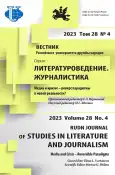Цифровая коммуникативная капитализация в эпоху платформ и коммуникационного изобилия
- Авторы: Гавра Д.П.1, Декалов В.В.1
-
Учреждения:
- Санкт-Петербургский государственный университет
- Выпуск: Том 28, № 4 (2023): Медиа и кризис – реверс парадигмы в новой реальности?
- Страницы: 734-740
- Раздел: Журналистика
- URL: https://journal-vniispk.ru/2312-9220/article/view/319108
- DOI: https://doi.org/10.22363/2312-9220-2023-28-4-734-740
- EDN: https://elibrary.ru/KOJATN
- ID: 319108
Цитировать
Полный текст
Аннотация
Рассматривается модель цифровой коммуникативной капитализации как важнейший социально-экономический процесс эпохи коммуникационного изобилия. Люди и организации позиционируются как инвесторы, действующие на различных рынках цифрового внимания. Основная гипотеза: инвесторы обладают разными способностями к осознанию и использованию в своих интересах возможностей, которые предлагают им рынки внимания с точки зрения накопления и преумножения капитала. Исследование проведено с опорой на устоявшиеся представления о различных формах капитала, введенные П. Бурдье, а также на связанные с ними понятия нематериального капитала, разработанные в широком спектре научных работ по цифровизации и критической теории интернета. Основываясь на этих понятиях, подчеркивается отсутствие прозрачности в процессах преобразования цифровых отражений капиталов в их реальные формы и предлагаются новые термины - цифровой коммуникативный капитал и двойная эксплуатация внимания. Последний термин подчеркивает новые уровни цифрового неравенства, где результаты цифрового труда захватываются и монетизируются. Анализ потенциальной разработки всей модели цифровой коммуникативной капитализации и намеченные эмпирические перспективы ее применения составляют особую ценность исследования.
Об авторах
Дмитрий Петрович Гавра
Санкт-Петербургский государственный университет
Email: d.gavra@spbu.ru
ORCID iD: 0000-0002-6536-9277
доктор социологических наук, профессор, заведующий кафедрой связей с общественностью в бизнесе, Высшая школа журналистики и массовых коммуникаций
Российская Федерация, 199004, Санкт-Петербург, 1-я линия Васильевского острова, д. 26Владислав Владимирович Декалов
Санкт-Петербургский государственный университет
Автор, ответственный за переписку.
Email: v.dekalov@spbu.ru
ORCID iD: 0000-0001-9850-3084
кандидат политических наук, доцент, кафедра связей с общественностью в бизнесе, Высшая школа журналистики и массовых коммуникаций
Российская Федерация, 199004, Санкт-Петербург, 1-я линия Васильевского острова, д. 26Список литературы
- Bourdieu, P. (1986). The forms of capital. In J. Richardson (Ed.), Handbook of Theory and Research for the Sociology of Education (pp. 241-258). Westport, CT: Greenwood.
- Dean, J. (2010). Blog theory. Cambridge: Polity Press.
- Dekalov, V.V. (2017). Attention as the basic resource of communicative capitalism. Russian School of Public Relations, 10, 27-38. (In Russ.)
- Faucher, K.X. (2018). Social capital online: Alienation and accumulation. London: University of Westminster Press.
- Fuchs, C. (2016). Critical theory of communication: New readings of Lukacs, Adorno, Marcuse, Honneth and Habermas in the age of the Internet. London: University of Westminster Press.
- Gavra, D., Dekalov, V., & Naumenko, K. (2020). Digital subjects as new power actors: A critical view on political, media-, and digital spaces intersection. In I. Kotenko, C. Badica, V. Desnitsky, D. El Baz & M. Ivanovic (Eds.), IDC 2019: Intelligent Distributed Computing XIII (pp. 233-243). Cham: Springer. https://doi.org/10.1007/978-3-030-32258-8_28
- Kean, J. (2013). Democracy and media decadence. Cambridge: Cambridge University Press.
- Nixon, B. (2017). Recovering audience labor from audience commodity theory: Advertising as capitalizing on the work of signification. In J.F. Hamilton, R. Bodle & E. Korin (Eds.), Explorations in Critical Studies of Advertising (pp. 99-114). New York: Routledge.
- Park, S. (2017). Digital capital. London: Palgrave Macmillan.
- Ragnedda, M. (2018). Conceptualizing digital capital. Telematics and Informatics, 35(8), 2366-2375. https://doi.org/10.1016/j.tele.2018.10.006
- Rushkoff, D. (2019). Team human. New York: W. W. Norton & Company.
- Shilina, M.G. (2012). Communication in the Internet: Conceptual apparatus of researches in the 21st century (the issue of creating a categorical and conceptual apparatus). Mediascope, (2). (In Russ.) Retrieved February 19, 2024, from http://www.mediascope.ru/node/1081
- Srnicek, N. (2017). Platform capitalism. Cambridge: Polity Press.
- Williams, J. (2018). Stand out of our light. Cambridge: Cambridge University Press.
- Wu, T. (2016). The attention merchants. The epic scramble to get inside our heads. New York: Penguin Random House.
- Zuboff, S. (2019). The age of surveillance capitalism. The fight for a human future at the new frontier of power. New York: Public Affairs.
Дополнительные файлы









